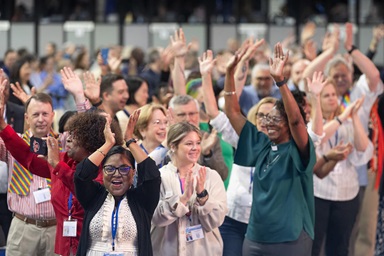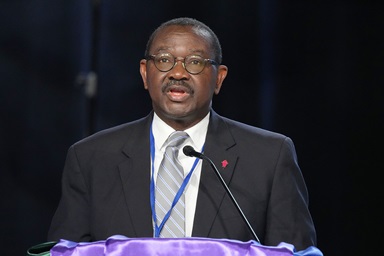Key Points:
- General Conference delegates say they have yet to receive critical logistical information that they usually receive months before the big event.
- Organizers of the United Methodist lawmaking assembly promise to get much of that information out by the end of the week.
- In the meantime, delegates express anxiety about the lack of communication about the long-delayed gathering, which is largely funded by church giving.
With General Conference set to start in 10 weeks, delegates around the globe are raising alarms that they lack details about the long-delayed legislative assembly.
General Conference organizers told United Methodist News that they plan to communicate many of those details by the end of this week and in early March.
In the meantime, delegates have plenty of concerns about the planning of The United Methodist Church’s big meeting, scheduled for April 23-May 3 in Charlotte, North Carolina.
“I respect the enormity of the task, and I don’t doubt the goodwill of anybody in the process,” said Tom Lee, a delegate from the Tennessee-Western Kentucky Conference. “But I think what troubles me about this is that one of the things that, as a United Methodist, I choose to hold to is our connection. And so it's important that our connection work.”
Delegates from the U.S. express concern that they have yet to receive any information about their travel or hotel arrangements.
Some delegates outside the U.S. say they have not yet received an invitation letter — the crucial first step to obtaining a visa to travel to General Conference.
Delegates in various countries also report they still do not have full access to the proposed legislation that they will vote on at General Conference.
Both the logistical information and legislation are usually available to delegates months before the big event. Typically, U.S. delegates have their travel and hotel arrangements in hand by the beginning of the year of General Conference.
Many of the concerns that delegates express come down to a lack of communication. Delegates say they haven’t been told why things are behind.
“I'm prepared to spend two weeks away from family, away from home, away from job and at General Conference,” Lee said. “I would just like it if somebody would say that there is a reason for that.”
The stakes are high. General Conference, which draws lay and clergy delegates from four continents, is the only body that can set official policy for the international denomination.
General Conference orientation
A livestreamed orientation to help prepare General Conference delegates is scheduled 9 a.m. to 1 p.m. U.S. Central time Feb. 29-March 1 as a partnership between the United Methodist News team of United Methodist Communications and the Rev. Gary Graves, secretary of the General Conference.
Plans call for the coming General Conference to have 862 voting delegates — 55.9% from the U.S., 32% from Africa, 6% from the Philippines, 4.6% from Europe and the remainder from concordat churches that have close ties to The United Methodist Church.
The denomination’s annual conferences — regional bodies consisting of multiple congregations — elect the delegates. Half are clergy and half lay.
Typically, the lawmaking assembly gathers every four years. But the pandemic and resulting travel disruptions led to three postponements of General Conference from May 2020 to now this year.
This General Conference comes as the denomination is grappling with the departure of about a quarter of its U.S. churches amid intensifying debates about the place of LGBTQ people in church life.
The lawmaking assembly also will deal with matters as varied as the denomination’s budget, social teachings, ecumenical relations and international structure. In short, the decisions General Conference delegates make will shape church life for years to come.
“If the conference itself is not well managed, it challenges our ability to do good work,” said the Rev. Mark Holland, a delegate from the Great Plains Conference. “And if a large swath of delegates aren’t present, it questions the legitimacy of the General Conference.”
Holland is the co-founder and executive director of Mainstream UMC, an unofficial centrist United Methodist advocacy group. On Feb 5, he sent an email to the Mainstream UMC mailing list noting the “significant concerns” he was hearing from fellow delegates “about the lack of organization and communication from the event organizers.”
Indeed, delegates who don’t share Mainstream UMC’s legislative goals for General Conference do share similar worries about the event’s planning.
“This is the first time we’ve experienced this kind of delay in getting critical information,” said the Rev. Forbes Matonga, a veteran delegate from the Zimbabwe West Conference. Matonga is also a leader in the Africa Initiative, an unofficial traditionalist United Methodist advocacy group.
“Even as we speak today,” he told United Methodist News on Feb. 7, his delegation had not yet received invitation letters. He added that the delegates from Zimbabwe West also still do not have their General Conference ID numbers, which both serve as their credentials and allow them to access legislation online.
“We are really shocked that we can have these kind of organizational problems at this particular point in time,” he said.
The Rev. Gary Graves, the secretary of General Conference who oversees the event’s planning, told United Methodist News that delegates can expect to see many of their concerns resolved very soon.
He said annual conference secretaries and chairs of delegations in the U.S. should receive a packet of information by Feb. 16. That packet will include a housing verification form, instructions for requesting medical or dietary information and confirmation of delegate information.
Graves said the packet also will include a request that the chairs of delegations submit the list of any petitions — the General Conference equivalent of bills — submitted by individuals who have since left the denomination. Church law requires that petitions come only from individual United Methodists or United Methodist organizations.
He said updates are coming to delegates in the central conferences — church regions in Africa, Europe and the Philippines — through the process of passport verification and the issuance of invitation letters.
So far, Graves said his office has issued 320 of the 370 invitation letters needed for delegates to obtain visas. Of those remaining, he said:
- 21 are prepared and will be issued once delegates submit required passport information.
- 25 are for reserve delegates who are awaiting verification that they need to be seated for delegates who cannot attend.
- Two will be issued upon confirmation of the status of their annual conference.
- Two will not be issued because the Malawi Provisional Annual Conference did not hold delegate elections.
He said the General Conference office will assign housing based on the housing verification forms and release that information before March 15. He also said delegates should begin to hear about flight arrangements by March 1. General Conference organizers have contracted with the travel agency CTE to make the flight arrangements.
This General Conference, both the Advance Daily Christian Advocate, which contains proposed legislation, and the Daily Christian Advocate, which contains the meeting’s daily proceedings, will be online only.
Delegates with identification numbers already can access the Daily Christian Advocate website.
Graves said other delegate IDs will be issued once delegate changes are confirmed. In the meantime, he said, delegates can download PDF versions of the Advance Daily Christian Advocate.
The PDF versions remain a work in progress. The delegate handbook — which contains the agenda, the delegate lists and map of facilities — has not been updated since 2020, when General Conference was originally scheduled to be in Minneapolis. Likewise, the PDF version of legislation submitted since General Conference’s postponement is currently only available in English and is subject to final editing.
Brian Sigmon, the Daily Christian Advocate editor, said the goal is to have the full PDFs available including in the other official General Conference languages of French, Portuguese and Kiswahili by the first week of March.
General Conference is a major international undertaking that takes multiple years to plan. A 25-member Commission on the General Conference helps with the plan of organization for the event. But ultimately, much falls on the shoulders of General Conference staff led by the General Conference secretary, who is elected by General Conference.
The coming General Conference is projected to cost more than $10.2 million. That total includes not just delegate expenses but also the costs associated with meeting facilities, interpretation in 10 languages, legislation tracking software, worship and other programming.
The bulk of funding for General Conference comes from the General Administration Fund, which is supported by apportionments — shares of church giving — from the denomination’s 133 annual conferences. Put another way, United Methodist offerings make General Conference possible.
But General Conference funds pay only for primary delegates to attend. That leaves annual conferences or individuals footing the bill for reserve delegates to be on site.
If anything, the postponement has made things more complicated for General Conference. Multiple delegations have seen their membership change as the result of disaffiliations and other developments since 2020.
Reserve delegates have moved up to fill the seats of those who, for whatever reason, can no longer serve. The Judicial Council — The United Methodist Church’s top court — also ruled that annual conferences could hold elections to fill any vacancies in their General Conference delegations if their pool of reserves was empty.
The General Conference Commission also has issued stricter requirements for delegate credentials after an investigation in 2019 found four ineligible people cast votes during that year’s special General Conference using credentials of absent delegates.
Keeping Graves and General Conference staff informed of any delegation changes are annual conference secretaries, who are responsible for certifying delegate elections.
“We are the bridge between the General Conference and the head delegate,” said the Rev. Candace Barron, Arkansas Annual Conference secretary. In practice, that means she tries to make sure any communication from Graves is shared with her conference’s delegation chair and vice versa.
The Arkansas Conference has seen three changes in its General Conference delegation after delegates had to step away. Barron said she has received confirmation that General Conference staff are aware that three reserve delegates have moved into the main delegation.
However, others have seen more changes and, in some cases, are still awaiting confirmation.
For example, of the 12 delegates from the Western Pennsylvania Conference, only half are the originally elected delegates. The other six are reserves who have moved up to take the place of those who resigned. Those six still do not have delegate ID numbers and that means they can’t access the online Advance Daily Christian Advocate, said the Rev. Alyce Weaver Dunn, the head of the delegation.
The General Conference office reached out to confirm Western Pennsylvania’s current slate of delegates at the end of January, she said.
In the past, delegations made their own reservations in the room blocks that General Conference staff had reserved. This time, the General Conference office is coordinating all housing together.
The slower timeline has caught many delegates off-guard and caused other complications.
Monalisa Tui’tahi, co-chair of the California-Pacific Conference delegation, said she emailed Graves last September to ensure the delegation had provided the General Conference staff what they needed for travel and housing arrangements. He immediately responded, telling her to wait for General Conference staff to confirm her delegation’s needs.
But she was surprised she hadn’t heard anything from the office since. The delay in knowing where the primary delegates will stay creates even more uncertainty in finding accommodations for reserve delegates, she said.
“Reserve delegates help resource our main delegates, and we know at least we’re being taken care of, supposedly, but they still have to look for housing,” she said.
Subscribe to our
e-newsletter
Not every delegation reports struggling to get what they need to attend. In fact, some report being well on their way to getting necessary visas.
Visa access is a challenge at every General Conference. Thirty-one delegates were absent from the 2019 special General Conference — including the entire East Angola delegation — because they could not get visas in time.
The Rev. Betty Kazadi Musau, a delegate from the North Katanga Conference, said everyone in her delegation has received invitation letters and delegates are making good progress in obtaining visas. North Katanga has the single largest delegation at General Conference.
Of its 66 delegates, she said, 42 now have their visas and the others are waiting to complete their visa interview appointments. She said the General Conference staff need copies of visas before sending out travel itineraries and hotel information.
The Rev. Gift K. Machinga, the head of the Zimbabwe East Conference delegation, said all four primary delegates have received invitation letters as of the end of September. Three now have visas, and another has an interview scheduled once his current visa expires in March.
“While we celebrate that our delegation did not face challenges in this regard, we are greatly concerned and stand in solidarity with some of our African brothers and sisters who are facing challenges,” Machinga said. He noted, as Matonga did, that Zimbabwe West delegates have yet to receive their invitation letters.
He also worried about reserve delegates who still do not have invitation letters to allow them to acquire visas.
Beyond that, his biggest worry is that he has not received the most recent conference materials and documents.
“I have, in my other capacity as conference secretary, communicated our concerns and we await their response,” he said. “My hope is that all the concerns raised from every corner be addressed diligently and urgently. We are a big denomination that, in my view, cannot fail to address such issues.”
Jorge Lockward, a delegate from the New York Conference and General Conference commission member, has long been raising concerns behind the scenes about delegates’ visa access. He said that U.S. delegates are now dealing with the same struggles many delegates in central conferences face.
“It took this affecting American delegates for people to start caring, and that’s the truth,” he said.
He added that going forward, General Conference needs “to create safeguards so this doesn’t happen again.”
He said that could include adding in more accountability measures. The coming General Conference will elect all members of the next commission as well as the General Conference secretary.
Graves said he and other General Conference leaders are open to answering questions and receiving constructive suggestions.
The leaders, he added, “are concerned about the tone of some of the recently shared thoughts on the matter.”
“Accountability is advisable,” he said, “but accusatory or speculative assertions about the motive behind the work or decisions made are not beneficial to creating the tone and atmosphere necessary for positive Christian conferencing.”
Holland of Mainstream UMC said that this close to General Conference, delegates should know their flight information, hotel accommodations and meal plans.
“If I planned a family reunion like this, with 30 of us, my sisters would beat me with a stick.”
Hahn is assistant news editor for UM News. Contact her at (615) 742-5470 or newsdesk@umcom.org. To read more United Methodist news, subscribe to the free Daily or Friday Digests.
Like what you're reading? Support the ministry of UM News! Your support ensures the latest denominational news, dynamic stories and informative articles will continue to connect our global community. Make a tax-deductible donation at ResourceUMC.org/GiveUMCom.



